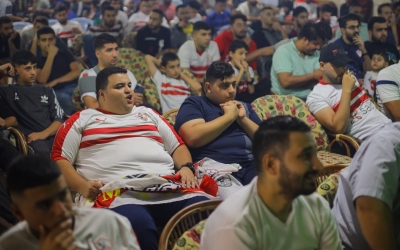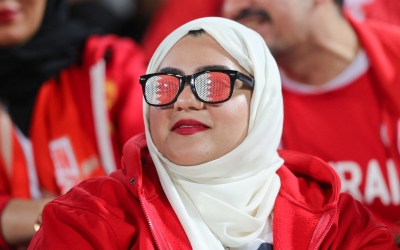Qatar World Cup: Israeli fans undeterred by security concerns

Football is a game that thrives on its traditions.
It's a sport that celebrates its past, and unites people in a way that little else does.
For Roy Sagir, an Israeli football fan in his late 20s, the Qatar World Cup has elicited excitement across the Middle East unlike any other tournament before.
'The food, the views, the culture, the people - everything sounds so special and probably different from what we know'
- Roy Sagir, Israeli football fan
With less than a week to go before the event kicks off, Sagir told Middle East Eye that it was this buzz and passion for the game that led him to buy tickets - and neither security concerns or the absence of diplomatic ties could stop him from attending the greatest sporting spectacle in the world.
"Honestly, we didn't pay any attention to safety and the security issue", he told MEE.
"We trust Fifa and the Qataris that everything will be just fine."
Israel is not competing in the 32-team tournament, but thousands of Israeli tourists are expected to descend on the Qatari capital on unprecedented direct flights.
In a breakthrough agreement announced last week, Fifa said fans would be able to travel directly from Tel Aviv to Doha to attend matches. The announcment said it would be open to both Israeli and Palestinian ticket holders, but did not clarify how residents of the occupied West Bank and the Gaza Strip can make the journey.
'Once-in-a-lifetime opportunity'
The beautiful game is deeply popular in Israel with the big teams - Maccabi Haifa and Maccabi Tel Aviv - attracting an average of 28,833 and 22,890 spectators respectively per match.
These are impressive numbers by all counts, but local football doesn't even come close to the popularity of football games abroad.
Israeli fans are accustomed to travelling to Europe to see some of the world's best football in person, with around 20,000 Israelis heading to Spain every season to watch the Superclasico between Barcelona and Real Madrid.
The fact that the most prestigious competition in the sport is coming to the region for the first time is a chance that many feel they cannot pass up.
"We were in Russia and we enjoyed it so much, that we decided to do everything we can to be in Qatar in 2022," Sagir said.
You can't blame him. For the average Israeli, Qatar is a country otherwise off-limits and that's the reason why he's excited to go.
"It is a once-in-a-lifetime opportunity to visit the country, and it would be my first time in the Gulf too. The food, the views, the culture, the people - everything sounds so special and probably different from what we know".
Sagir is not the only one who's excited.
The temporary flights will also make it easier for Palestinian citizens of Israel to reach Doha, a journey that would otherwise take them longer.
Khaled Nemer Khalailah has been waiting for this moment since 2010.
"At the moment it was announced that Qatar will host it, I told myself: I must be there," he told MEE.
"I'm sure it will bring more World Cups to the region, with other nations getting the appetite to host it too", he added.
Just like Sagir, Khalailah is not concerned about security issues. "I am not afraid at all. Security wasn't on the list of my priorities. The hotel was the bigger concern," he said, laughing off security concerns.
Fans should be responsible
Sagir and Khalailah are not alone. Tawfiq Hawamdeh, a Palestinian from Hebron, will also be in Qatar. Unlike Gaza residents, West Bank Palestinians are not supposed to encounter difficulties when travelling to Qatar.
"It was easy. I contacted the local World Cup tickets distributor a couple of months before the group stage draw, bought a package with a visa and a flight via Jordan - and here we go, " he said.
Hawamdeh said the tournament could encourage more Middle Eastern nations to bid to host high-profile tournaments, but he couldn't see the occasion driving dramatic changes in the region.
"I am excited about the tournament but I don't think it will have a significant impact on Middle Eastern reality. Things here will always be more complicated than a World Cup or another big sports event".
While Khalailah and Hawamdeh speak Arabic fluently and should be able to travel to Qatar relatively easily without attracting much attention, one would assume that Sagir, who isn't a native Arabic speaker but can converse in rudimentary Arabic, would be aware of the risks in such travel.
'Qatar can easily make sure that nothing happens to any of the fans who will arrive'
- Miki Weinberg, Israeli security expert
That's not the case. "Even if we identify as Israelis, we don't believe there will be any security incidents," said Sagir.
So, if the trio and nearly ten thousand Israelis are relatively relaxed about travelling to Qatar for the World Cup, who should be worried then?
"If I was the Qatari authorities, I would see the Israeli fans as a group that might attract unnecessary attention," Miki Weinberg, an Israeli security expert, told MEE.
"It's not normal that such [an] amount of Israelis are landing in an Arab country with no official diplomatic relations with Israel. The National Security Council [of Israel] will issue a certain travel warning."
Israel already recommends against all non-essential travel to Qatar, but has not raised its warning level from 3 to 4, the highest grade.
"Israeli citizens that bought tickets to the World Cup are allowed to decide for themselves, and the state should not prevent them from attending," Weinberg said.
"Israel can issue a general travel warning, but it won't be responsible for the private security of the travelling fans. If a fan wants to travel to Qatar, he has to be responsible for himself."
Temporary consular service
In another first, Israel will set up a temporary consular service for citizens at the tournament even though the countries have no diplomatic relations.
The office is expected to assist any Israelis who lose their passport, are detained or questioned, or need evacuation due to a health emergency.
Israeli government officials refused to respond to MEE's questions on the matter, but Weinberg thinks that the Israeli-Qatari security cooperation will be more under the surface than visible.
"I don't think Israeli forces will travel to Qatar for security reasons, but for sure there will be some representative that will work with the authorities and the organisers, to make sure that everything is under control."
According to Weinberg, at least one collaboration might already exist, and it's not aimed at serving Israelis only. "I won't be surprised if Israeli cyber companies will secure some aspects of the World Cup events. Although there are no diplomatic ties, there are business ties and good ones."
With fans travelling calmly, is there any risk with Israelis walking by Souq Waqif market and taking the train to Lusail Stadium?
"It's 50 years since the Munich terrorist attack [in the 1972 Munich Olympics when 11 Israeli-Jewish athletes were killed]," said Maor Dayan, another Israeli football fan that thought about going to Qatar, but decided to pass due to his and his family's security concerns.
"The World Cup is a party of football. Why should I put myself in [a] party with a high risk to be a 'target' for someone?"
'Every inch will be secure'
While past tragedies sit in the minds of some fans, Weinberg has played down their concerns.
"Qatar knows it as well and invested heavily in security," he said. "There will be several types of police and security forces on the ground, and in addition to the high-end technology tools, Qatar can easily make sure that nothing happens to any of the fans who will arrive."
MEE has previously reported that Qatar has signed memoranda of understanding with Turkey, France, the United States, Morocco, Pakistan and the UK, among others, to provide security equipment and personnel and share best practice.
"I won't be surprised if we see more support from other countries. Qatar will not let anything wrong happen," stated Weinberg. "Yet, is there a better event than the World Cup for a terrorist organisation to produce a quality attack on fans?" he added.
"If I am a smart Israeli, who is aware of the travel warning but yet decided to go, I'll act in a preventive and careful manner. I would not identify as an Israeli to strangers, I won't be an extrovert and reveal my nationality everywhere, and I'll be very aware of my surroundings."
According to Weinberg, any attacks against Israeli fans could severely tarnish Qatar's image in the West as it attemps to burnish its credentials following a wave of negative media coverage over its treatment of migrant workers.
"An attack on fans is the biggest danger to a host country," he said. "It doesn't matter if the victims are Israeli or not. For Qatar, such an attack would be a disaster."
According to Spanish outlet Marca, supporters of the Islamic State group have been using the messaging app Telegram to detail plans of attacks.
With the British Foreign Office warning that "terrorists are likely to try to carry out attacks" in Qatar, Weinberg said that there were stringent security measures in place to protect visiting fans.
"Israeli fans should be responsible and aware, but also Qatar and the organisers. With advance intelligence technologies that are in use for such tournaments, every inch of the peninsula will be secured. Israeli fans can be calm. The organisers won't let anything happen."
Middle East Eye propose une couverture et une analyse indépendantes et incomparables du Moyen-Orient, de l’Afrique du Nord et d’autres régions du monde. Pour en savoir plus sur la reprise de ce contenu et les frais qui s’appliquent, veuillez remplir ce formulaire [en anglais]. Pour en savoir plus sur MEE, cliquez ici [en anglais].




